
The 2024 Bosch Connected World conference closed with an Elon Musk interview
"The computational power driving AI seems to be doubling every six months," said Musk. "This can't keep up forever, but it's the most dramatic technological shift I've ever witnessed. It's like a chip rush that dwarfs any gold rush in history."
This rapid advancement, however, comes with growing pains. Musk acknowledged the potential for AI to become a dominant force, even expressing a morbid curiosity about such a scenario.
Would I rather witness the AI apocalypse or not? It wouldn't be boring, that's for sure
The interview highlighted the specific bottlenecks emerging in this growth. Initially, a shortage of specialised AI chips hampered progress. Now, the focus has shifted to the power infrastructure needed to support these ever-growing computing demands.
"The limitations on AI compute are becoming clear," he explained. "First, it was chips, then transformers. Stepping down massive amounts of power from the grid to the low voltage these systems require is a major challenge. Ironically, transformers are needed to power the systems researching transformers! It's a logistical ouroboros."
AI’s ripple effect
Musk concluded by addressing the ripple effect of this AI boom. With the rise of electric vehicles, another sector with a massive power demand, a potential electricity crisis looms on the horizon.
"The combined pressure from AI and electric cars on electricity and transformer production is creating an unprecedented strain on our power infrastructure," he warned.
He illustrated his point by drawing parallels between the current situation and historical advancements.
The automotive industry lived with 12 volts for a century
"The shift to higher voltage for electric vehicles mirrors the need for a power grid overhaul to keep pace with AI."
This glimpse into the world of AI development highlights the incredible pace of innovation while simultaneously raising concerns about the logistical hurdles that could impede this technological revolution.
































